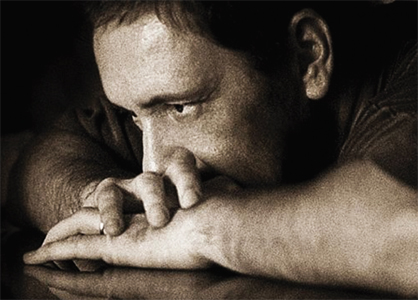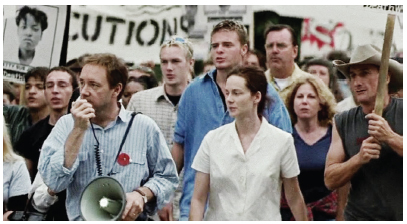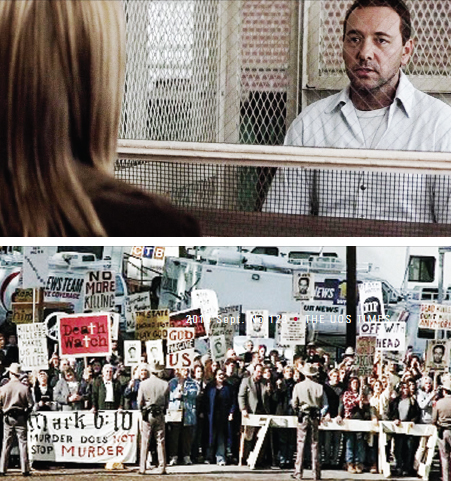

The movie starts with a scene where Bitsey Bloom, a journalist from a news magazine, is visiting a prison to interview Gale who is sentenced to death for a murder. He has only few days left until his execution. He tells her the story of how he ended up on death row.
Gale is a promising philosophy professor and an active member of DeathWatch, a group campaigning against capital punishment. One day, he goes to a party, and there he meets Berlin, a student who is expelled from school. She lures Gale and then accuses him of rape. Gale later proves his innocence, but he has already lost his career, reputation and family.
There is only one person left beside Gale. It is his close friend Constance Harraway, and she is also a member of DeathWatch. One day she is diagnosed with leukemia. That night, Gale consoles her and sleeps with her. The next day, she is discovered raped and murdered with her mouth taped, and her head covered with a plastic bag. Gale’s semen is found in her body which points Gale as a suspect and this helps sentence him to death.
As the interview goes on, Bloom is convinced of Gale’s innocence, so she inspects the crime scene and gathers evidence to prove it. Finally, she finds a videotape that can release Gale from the charge of murder a few hours before Gale’s execution. The tape records Harraway’s suicide and Bloom tries to give this to the authorities in time to stop the execution. However, when she arrives at the prison, Gale has already been executed.
Reversal in this movie
Later, a videotape labeled ‘Off the Record’ is delivered to Bloom. The tape shows Gale helping with Harraway’s suicide. In fact, everything about Gale’s execution is planned by Gale and Harraway. They sacrificed themselves and make Gale an innocent prisoner to point out the problems with the death penalty.
The Death Penalty Around the World
The movement to abolish the death penalty is growing all around the world. In the 1970s, the number of countries that had abolished capital punishment was just 16. However, according to a statistics report in 2012, which was released by Amnesty International, a group which campaigns against abuses of human rights, the number of countries that abolished the death penalty was 105. The number of countries whose status was ‘abolition in practice,’ which means ‘they have not executed anyone in 10 years,’ was 35. To sum up, two thirds of the countries have abolished the death penalty in law or in practice.
China, the country with the highest number of executed prisoners in today’s world, is known for its strict laws. 55 charges can be punished by a death sentence, and not only serious charge like murder but also relatively light charge like bribery can be given a death sentence. Human rights groups estimate China executes over 6000 criminals a year, which includes off-the-record executions.
In the U.S., 13 states such as Iowa and Massachusetts have abolished the death penalty. Some states, especially Texas, which is the setting of the film, continue executions and other states such as Montana are under discussion whether the death penalty should be abolished.
Korea is now an abolition-in-practice country. No Korean prisoner on death row has been executed since 1997, and there are over 60 people who are on the list. Recently however, voices that execution should be continued are getting bigger as violent crimes occur more often.

Today, criminal punishment problems have become a matter of great interest because of continual serious crimes. According to a recent poll, about 80 percent of people in Korea agree with the capital punishment. Experts explain this as an influence of Confucianism culture. Koreans think punishing immorality is more important than respecting life.
These people claim that the death penalty system is the most defensive tool to prevent future crimes. They say it makes criminals keep awareness of strict responsibilities and about the wrong behaviors in their minds. They claim that we also should think about the victim’s human rights. For example, it is a contradiction to guarantee the human rights of Yu Young-chul, who killed 20 people. From this point of view, the death penalty is the nation’s obligation to protect human rights.
Contrary to this, people who oppose the death penalty maintain that it does not reduce the crime rate. Also, it can be abused for political purposes, as it did in the past when Korea was under dictatorship. They insist there are enough alternative punishment systems for the death penalty.
This film reminds us to think about the death penalty system. There are many reasons to support each side. As the film shows, they each have their own strong beliefs and it is very hard to choose what to do about the death penalty system with such tense conflict. However, the public’s interests about the issue are getting higher, and it seems that the dispute over the death penalty will boil up for awhile.
Have you ever thought about the death penalty? If so, which side do you stand for?
Lee Ji-min Junior Reporter
kikii32@uos.ac.kr

